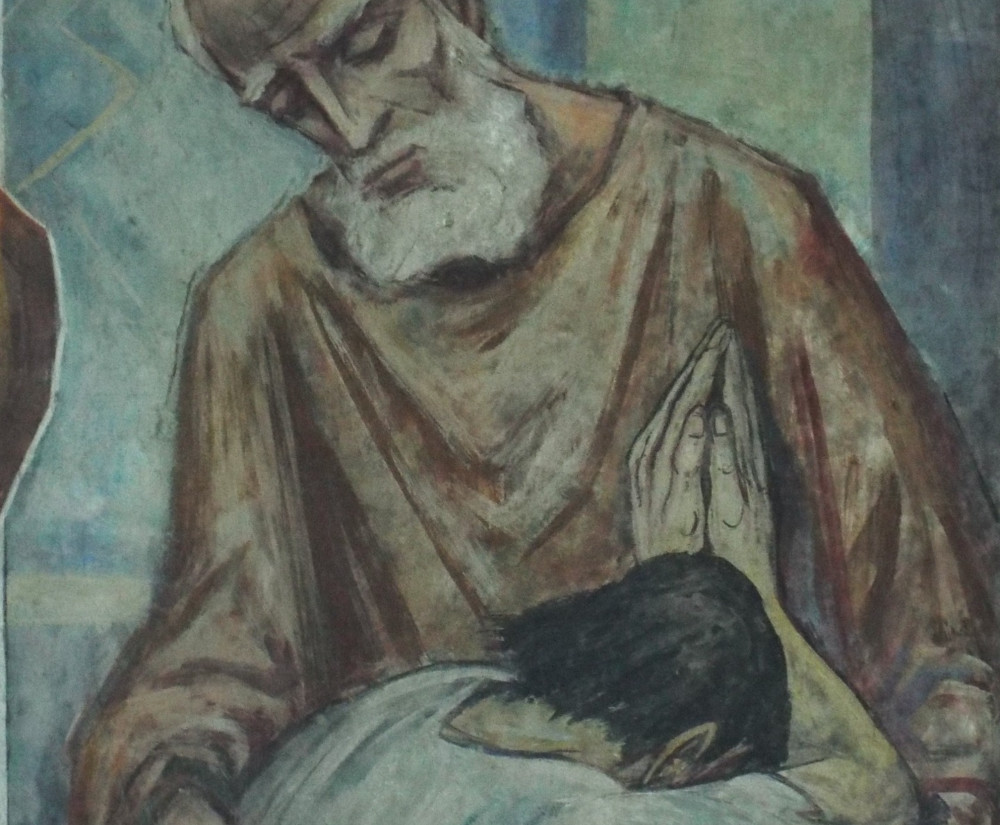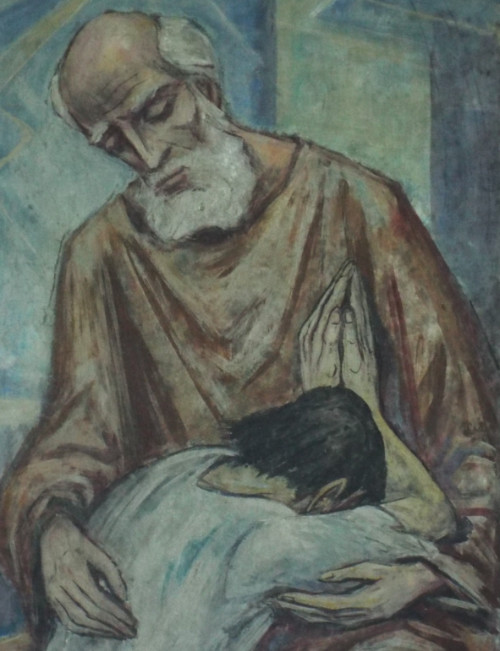
NILS VON KALM looks at the importance – and power – of forgiveness especially in the lives of those who have been deeply hurt…
Sometimes I don’t know whether I’ve forgiven someone or not. We often think we have, but when we think of the hurt that has been done to us by someone and then we think of the idea of forgiving that person, it can feel literally impossible.
It’s then that we realise that we want the person to pay for what they did to us. Desiring their death is not an uncommon reaction within us. It’s then that we realise we still have deep hurt to deal with. Until we face the horror of what we actually desire of someone and our own hatred of them, we will never learn to forgive.

A depiction of the Biblical parable of the Prodigal Son, a powerful story of forgiveness, in a church. PICTURE: Pumukel/Pixabay
“Jesus said that those who have been forgiven much love much, and those who have been forgiven little love little. He knew how human nature works.”
What does it mean to forgive someone when they have hurt us so deeply? I’ve heard someone say that they can’t forgive because the other person has hurt them too much. In those cases, pious platitudes from others to “just forgive” mean nothing and can actually be dangerous because they can lead someone to thinking they have forgiven someone when they haven’t and still harbour resentment in their heart.
I’ve heard it said that resentment is reliving the pain of our past hurts. Until we realise that neither our resentment nor forgiveness can change the other person, we will probably not be able to forgive.
Jesus said that those who have been forgiven much love much, and those who have been forgiven little love little. He knew how human nature works. When we have done huge things wrong but are still forgiven, we can be overwhelmed by the forgiveness we have received. That’s why the ‘sinful’ woman who anointed Jesus with her hair, wept (Luke 7:36-50). She was overwhelmed by the fact that her many sins were forgiven.
What did that mean for her? It meant that her sense of dignity had returned. She knew herself to be a person of worth and that nothing could ever change that. Her many sins could not ever change the fact that she was a person of immeasurable worth. That doesn’t mean that her sins didn’t matter; they did. But they couldn’t stop her experiencing and knowing the freedom she could now live with.
Forgiveness must not ever be confused with codependence. The former acknowledges that deep hurt has been done, while the latter doesn’t. The latter says it’s OK when it’s actually not. You can’t sugarcoat evil. When evil is done to someone, we can’t ever say it’s OK. That further damages the person who has been hurt. It minimises their sense of dignity.
How do you come to a place of forgiveness of deep hurt? It is only through facing and feeling the hurt we have experienced, not sugar-coating it, not sweeping it under the carpet and medicating it. We need to feel the full force of the hurt we have experienced. Either way, it will come out. If it’s not dealt with, it will come out in projection against others. Hurt people hurt people. But if it is dealt with, it has the potential to be transformed. That is when we see and know that the pain of letting go of the hurt is less than the pain of continuing to hang onto it. Then and only then will we have forgiven those who have hurt us.
It is an arduous process. It can be stop-start, and it can feel like we have finally forgiven only to one day still realise we feel the resentment and anger against that person. Over time though, as we face and deal with our deep hurt, the resentment and anger will diminish, until we reach the point where we can actually say we love and want the best for the other person. This is loving our enemies.
The problem with promoting forgiveness, though, is that it appears weak; it appears like we are letting the person who committed the hurt walk all over us and get away with it without learning their lesson. On the contrary, forgiveness is actually strength. Can you see the strength it would take to actually love your enemies? I don’t mean just being nice to them because you’re supposed to. I mean actually loving them because you’ve forgiven them and really want the best for them.
This is what Jesus did when He said from the cross, “Father, forgive them, for they know not what they do” (Luke 23:34). Imagine that. Imagine hanging on a Roman cross being crucified; the most shameful and humiliating death imaginable. And you actually want the people who did this to you to be forgiven. Again, Jesus isn’t just being nice because forgiveness is the Christian thing to do. He really loves them. In the moment of His greatest anguish, as He’s hanging on that cross, His body disfigured from lashings and now struggling to stay alive, and knowing that He is very soon going to die, He actually, really, wants the best for these people. Can you imagine a greater love? I don’t think I can.
The strength of forgiveness also lies in the reason we do it. Martin Luther King, Jr, said that if we don’t forgive, we just add to the hatred in the world. He said, “hate cannot drive out hate; only love can do that. Hate multiplies hate…in a descending spiral of destruction”.
It’s no wonder that it has been said that to forgive is divine. Forgiveness is extraordinarily difficult, to the point that I believe we need outside help to do it. I think of the father in the story of the prodigal son (Luke 15:11-32). He sets aside any ego, lifts up his robe and does the unthinkable for a father at that time: he runs toward his son. He lets himself be overwhelmed by the joy of seeing his son returning to the fold. That’s love. That’s forgiveness. He didn’t do what the older brother (representing the Pharisees) did and recount the younger brother’s many sins. In fact, when the younger brother himself started to recount his own sins, the father told him to hush because a welcome home party was about to start. This is the love that Paul spoke about in I Corinthians 13. It keeps no record of wrongs.
Any thoughts we have about the lesson that needs to be learned so the person won’t do it again don’t matter. Love teaches the lesson. It is kindness that leads us to change our ways. If only we believed this, the world and our relationships would be a lot more harmonious and healthy.





